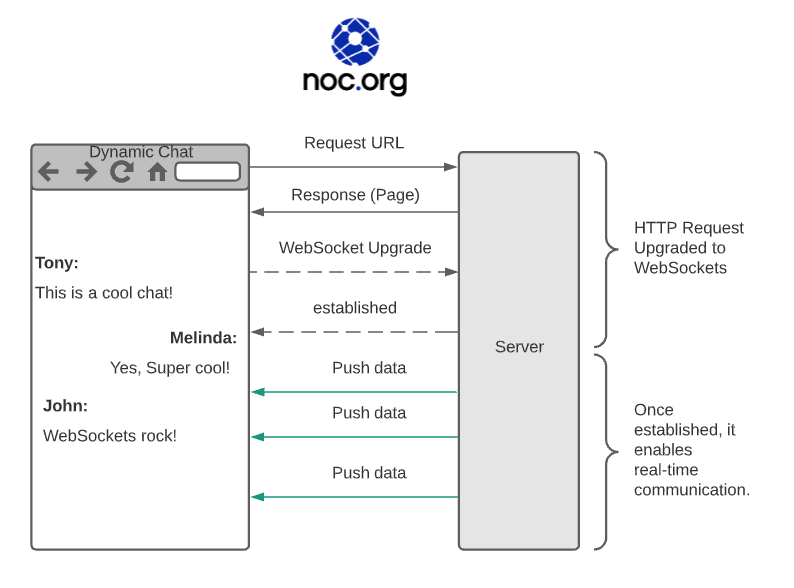The NOC platform runs a global anycast CDN/WAF with points of presence around the world. While anyone with a domain can use the platform, agencies and hosts managing many properties see outsized benefits from the scale and built-in security.
Today we’re excited to announce full support for WebSocket connections at the edge. Many CDNs limit concurrency or gate features by plan tier; our approach is simple—no artificial per-site connection caps and a consistent configuration model across accounts.
What are WebSockets?
WebSockets (standardized in 2011) upgrade an initial HTTP/1.1 request to a persistent, bidirectional TCP channel between browser and server. That persistent channel enables low-latency, event-driven updates without polling.
Where this matters:
- Live chat and collaboration apps
- Real-time dashboards, trading tickers, telemetry streams
- Multiplayer games and presence indicators
- Push notifications and streaming updates
WebSockets don’t replace HTTP—they extend it for the specific cases where you need real-time bidirectional communication.

NOC’s WebSocket Support
- Edge termination & pass-through: We handle the HTTP Upgrade handshake at the edge and maintain persistent upstream connections to your origin.
- No plan-tier caps: No arbitrary per-zone concurrency thresholds.
- Anycast absorption: Connections land on the closest POP, reducing latency and central origin bottlenecks.
- WAF aware: Handshake and message frames are subject to sane defaults; you can tune rules for your app’s patterns.
Readiness Checklist for Your Origin
- Enable Upgrade flow: Ensure your app/server supports
Upgrade: websocketandConnection: Upgradeon the initial handshake. - Keep-alive/timeouts: Increase idle timeouts to accommodate long-lived connections; avoid aggressive proxies that drop idle sockets.
- Health & scaling: Monitor connection counts and memory; use horizontal scaling where possible.
- WAF tuning: If you use custom subprotocols or large messages, adjust size and anomaly limits accordingly.
Notes & Best Practices
- Authenticate early: Perform auth on the HTTP request before the upgrade (cookies, headers, or query tokens) and re-check on reconnects.
- Backoff & jitter: Implement exponential backoff on client reconnect loops.
- Path hygiene: Terminate WebSockets on a dedicated path (e.g.,
/ws) to simplify policy and routing. - Observability: Track connection lifecycle events, message rates, and error codes at the edge and origin.
NOC — Authoritative DNS, CDN & WAF
Accelerate and protect your sites with global DNS, edge caching, and an always-on web application firewall.
See Plans